Marilao
Marilao, officially the Municipality of Marilao (Tagalog: Bayan ng Marilao), is a 1st class municipality in the province of Bulacan, Philippines. According to the 2020 census, it has a population of 254,453 people.[4]
Marilao | |
|---|---|
| Municipality of Marilao | |
 Façade of the Municipal Hall | |
 Flag  Seal | |
| Motto: Handa Lagi Maglingkod | |
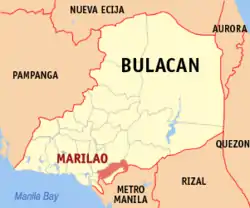 Map of Bulacan with Marilao highlighted | |
OpenStreetMap | |
.svg.png.webp) Marilao Location within the Philippines | |
| Coordinates: 14°45′29″N 120°56′53″E | |
| Country | Philippines |
| Region | Central Luzon |
| Province | Bulacan |
| District | 4th district |
| Founded | April 21, 1796 |
| Barangays | 16 (see Barangays) |
| Government | |
| • Type | Sangguniang Bayan |
| • Mayor | Henry R. Lutao |
| • Vice Mayor | Jun Bob J. Dela Cruz[2] |
| • Representative | Linabelle Ruth R. Villarica |
| • Municipal Council | Members |
| • Electorate | 101,490 voters (2022) |
| Area | |
| • Total | 33.74 km2 (13.03 sq mi) |
| Elevation | 9.0 m (29.5 ft) |
| Highest elevation | 47 m (154 ft) |
| Lowest elevation | −7 m (−23 ft) |
| Population (2020 census)[4] | |
| • Total | 254,453 |
| • Rank | 9 out of 1,489 Municipalities |
| • Density | 7,500/km2 (20,000/sq mi) |
| • Households | 62,109 |
| Economy | |
| • Income class | 1st municipal income class |
| • Poverty incidence | 3.60 |
| • Revenue | ₱ 936.5 million (2020) |
| • Assets | ₱ 1,713 million (2020) |
| • Expenditure | ₱ 864.8 million (2020) |
| • Liabilities | ₱ 547.2 million (2020) |
| Utilities | |
| • Electricity | Meralco |
| Time zone | UTC+8 (PST) |
| ZIP code | 3019 |
| PSGC | |
| IDD : area code | +63 (0)44 |
| Native languages | Tagalog |
| Website | www |
With the continuous expansion of Metro Manila, the municipality is part of Manila's built-up area which reaches San Ildefonso on its northernmost part. Marilao is 22 kilometers (14 mi) from Manila and 23 kilometers (14 mi) from Malolos City.
Marilao is one of the 21 Philippine municipalities that have met the requirements for cityhood set by the Constitution and Local Government Code of the Republic of the Philippines and as agreed upon by the League of Cities of the Philippines (LCP).
History
Long before the establishment as an independent town, Marilao traces its origin as little as a barrio. It was initially a barrio of its neighboring town Meycauayan and the Franciscan missionaries from Meycauayan built a visita (chapel) dedicated to Saint Michael the Archangel.
Marilao, just like Pangil, a town in Laguna, Philippines, was under the stewardship of the Franciscan order.
On April 21, 1796, the Barrio of Marilao was established as a pueblo as approved by the Alcalde Mayor of Bulacan and the Franciscan friars of Meycauayan, with the approval of Archbishop of Manila, the visita of San Miguel Arcangel became a town church where Padre Vicente de Talavera served as its parish priest. Between 1901 and 1903, it was consolidated with Meycauayan.[6] In 1913, Marilao completely became an independent town.[7]
Marilao's first church was established at a place called "tawiran", which is today the site of the old chapel, "bisitang matanda". This structure was built 50 years before Marilao became a town.
The municipal building was built on land near the old chapel, currently occupied by former mayor Mario Santiago. Today, the municipality is located near the church. The city market was built next to the city building.
Marilao became part of the railway built from Manila to Dagupan, Pangasinan on March 24, 1889.
Geography
Climate
| Climate data for Marilao, Bulacan | |||||||||||||
|---|---|---|---|---|---|---|---|---|---|---|---|---|---|
| Month | Jan | Feb | Mar | Apr | May | Jun | Jul | Aug | Sep | Oct | Nov | Dec | Year |
| Average high °C (°F) | 29 (84) |
30 (86) |
32 (90) |
34 (93) |
33 (91) |
31 (88) |
30 (86) |
29 (84) |
29 (84) |
30 (86) |
30 (86) |
29 (84) |
31 (87) |
| Average low °C (°F) | 20 (68) |
20 (68) |
21 (70) |
23 (73) |
24 (75) |
25 (77) |
24 (75) |
24 (75) |
24 (75) |
23 (73) |
22 (72) |
21 (70) |
23 (73) |
| Average precipitation mm (inches) | 7 (0.3) |
7 (0.3) |
9 (0.4) |
21 (0.8) |
101 (4.0) |
152 (6.0) |
188 (7.4) |
170 (6.7) |
159 (6.3) |
115 (4.5) |
47 (1.9) |
29 (1.1) |
1,005 (39.7) |
| Average rainy days | 3.3 | 3.5 | 11.1 | 8.1 | 18.9 | 23.5 | 26.4 | 25.5 | 24.5 | 19.6 | 10.4 | 6.4 | 181.2 |
| Source: Meteoblue[8] | |||||||||||||
Barangays
Marilao is politically subdivided into 16 barangays, all classified as urban.[9] Each barangay consists of puroks and some have sitios.
| PSGC | Barangay | Population | ±% p.a. | |||
|---|---|---|---|---|---|---|
| 2020[4] | 2010[10] | |||||
| 031411001 | Abangan Norte | 3.7% | 9,424 | 8,665 | 0.84% | |
| 031411002 | Abangan Sur | 3.8% | 9,625 | 9,788 | −0.17% | |
| 031411003 | Ibayo | 4.0% | 10,103 | 6,584 | 4.37% | |
| 031411004 | Lambakin | 16.8% | 42,821 | 37,007 | 1.47% | |
| 031411005 | Lias | 5.1% | 12,900 | 12,038 | 0.69% | |
| 031411006 | Loma de Gato | 22.6% | 57,569 | 46,286 | 2.21% | |
| 031411007 | Nagbalon | 1.6% | 4,015 | 3,766 | 0.64% | |
| 031411008 | Patubig | 2.9% | 7,501 | 6,113 | 2.07% | |
| 031411009 | Poblacion I | 0.7% | 1,826 | 1,661 | 0.95% | |
| 031411010 | Poblacion II | 2.2% | 5,475 | 5,536 | −0.11% | |
| 031411011 | Prenza I | 2.8% | 7,065 | 5,827 | 1.94% | |
| 031411012 | Prenza II | 4.4% | 11,229 | 6,507 | 5.61% | |
| 031411013 | Santa Rosa I | 4.2% | 10,793 | 9,921 | 0.85% | |
| 031411014 | Santa Rosa II | 3.8% | 9,648 | 8,510 | 1.26% | |
| 031411015 | Saog | 5.9% | 14,950 | 11,445 | 2.71% | |
| 031411016 | Tabing Ilog | 2.8% | 7,021 | 5,970 | 1.63% | |
| Total | 254,453 | 185,624 | 3.20% | |||
Most populous
Barangay Loma de Gato is now holds the most populous village both in the province of Bulacan and in Central Luzon region upon the division of barangay Muzon in the neighboring city of San Jose del Monte after the successful plebiscite approving the proposal in March 2023.[11][12]
Pollution and flooding
In 2007, Marilao, along with neighboring Meycauayan, share a slot in the list of the world's 30 most polluted places in the developing world drawn up by a private New York-based institute. In its report, “The World’s Worst Polluted Places” for 2007, the Blacksmith Institute said: “Industrial waste is haphazardly dumped into the Meycauayan, Marilao and Obando River system, a source of drinking and agricultural water supplies for the 250,000 people living in and around”[13] the Meycauayan-Marilao area.
Marilao is also notorious for frequent flooding during the monsoon season. A section of MacArthur Highway near SM City Marilao is in particular, prone to floods.[14]
Demographics
|
|
| ||||||||||||||||||||||||||||||||||||||||||||||||||||||
| Source: Philippine Statistics Authority[15][10][16][17] | ||||||||||||||||||||||||||||||||||||||||||||||||||||||||
In the 2020 census, the population of Marilao, Bulacan, was 254,453 people,[4] with a density of 7,500 inhabitants per square kilometer or 19,000 inhabitants per square mile.
Economy
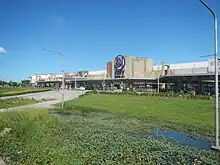
Government
Elected officials
| Position | Name | Party | |
|---|---|---|---|
| Mayor | Henry R. Lutao | PDP–Laban | |
| Vice Mayor | Jun Bob J. Dela Cruz[2] | NUP | |
| Councilors | |||
| Juanito "Tito" H. Santiago | PDP–Laban | ||
| Mary "Madel" A. Jasa | Aksyon | ||
| William "Willy" R. Villarica | PDP–Laban | ||
| Vanessa D. Valdez | PDP–Laban | ||
| Allane T. Sayo | PDP–Laban | ||
| Ariel "Aye" P. Amador | PDP–Laban | ||
| Andre Favian D. Santos | Independent | ||
| Maria Luisa I. Silvestre | Independent | ||
| Ex Officio Municipal Council Members | |||
| ABC President | Bayani P. Clemente | Nonpartisan | |
| SK Federation President | Ray Mart D. Sarmiento | Nonpartisan | |
List of local chief executives
| # | Mayor | Took office | Left office |
|---|---|---|---|
| 1 | Martin Villarica | 1913 | 1919 |
| 2 | Ceferino Santiago | 1912 | 1922 |
| 3 | Canuto Santo Tomas | 1922 | 1925 |
| 4 | Agripino San Miguel | 1925 | 1928 |
| 5 | Honorio Ramos | 1928 | 1931 |
| 6 | Miguel Villarica | 1931 | 1934 |
| 7 | Ricardo de Vera | 1934 | 1937 |
| 8 | Andres Roxas | 1937 | 1941 |
| (6) | Miguel Villarica | 1941 | 1944 |
| 9 | Benito Santa Rosa | 1945 | 1946 |
| 10 | Justino Cruz | 1946 | 1947 |
| (6) | Miguel Villarica | 1948 | 1951 |
| 11 | Mario Santiago | 1956 | 1971 |
| 12 | Nicanor Guillermo | 1972 | 1984 |
| 13 | Abelardo T. Dalmacio | 1984 | 1986 |
| 14 | Mario De Guzman Villarica | 1986 | 1987 |
| 15 | Israel Guevarra | 1987 | 1988 |
| (13) | Abelardo T. Dalmacio | 1988 | 30 June 1992 |
| 16 | Epifanio Guillermo | 30 June 1992 | 30 June 1995 |
| 17 | Leoncio Duran, Jr. | 30 June 1995 | 30 June 2004 |
| (16) | Epifanio Guillermo | 30 June 2004 | 30 June 2013 |
| 18 | Juanito H. Santiago | 30 June 2013 | 30 June 2019 |
| 19 | Ricardo Silvestre | 30 June 2019 | 9 October 2022[25] (Died in Office) |
| 20 | Henry Lutao | 25 October 2022 | Incumbent |
Education
The Pambayang Dalubhasaan ng Marilao Municipal College of Marilao is a public college in Marilao. The public primary and secondary schools in Marilao are governed by the Department of Education-Provincial Schools Division of Bulacan. Several private schools in Marilao also provide education services.
- Public High Schools
- Assemblywoman Felicita G. Bernardino Memorial Trade School(AFGBMTS)
- Prenza National High School(PNHS)
- Marilao Central Integrated School (MCIS (JHS founded in 2022) formerly Marilao Central School founded in 1920)
Religion
National Shrine of the Divine Mercy
It was elevated to the status of National Shrine by Archbishop Orlando Quevedo of the Catholic Bishops Conference of the Philippines. The first mass was held at the site on February 2, 1992, the Feast of the Presentation. Located in Barangay Santa Rosa I.
On the occasion of the World Apostolic Congress on Mercy in 2017, a 38-meter Statue of Merciful Jesus was built here.[26]
San Miguel Arcangel Parish Church
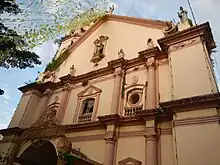
The Parish celebrates its patronal feasts on May 8 and September 29. Its 28th Parish Priest, Rev. Fr. Alberto D.J. Santiago succeeded Fr. Avelino G. Santos. Under Parochial Vicar, Fr. Francis Protacio S. Cortez III,OSA.[27] It is hundred years old spiritual edifice in Poblacion I considered as “place marker” and serve as “point of orientation” to the local residents and visitors.[28]
Our Lady of Fatima Parish Church

Located in Barangay Loma de Gato.
Our Lady of Mercy Quasi-parish Church
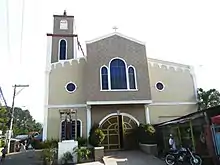
Located in Barangay Loma de Gato.
Other religions
There are also a presence of other religions in Marilao like the Iglesia ni Cristo, Jehovah's Witnesses, Evangelical Christians, Members Church of God International, etc.
Gallery
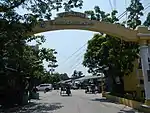 Marilao Welcome Arch along McArthur Highway
Marilao Welcome Arch along McArthur Highway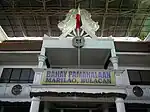 Old Marilao Municipal Hall, now Municipal Hall of Justice
Old Marilao Municipal Hall, now Municipal Hall of Justice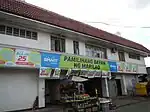 Marilao Wet and Dry Public Market
Marilao Wet and Dry Public Market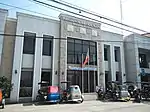 Lias Barangay Hall of
Lias Barangay Hall of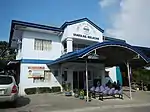 Loma de Gato Barangay Hall
Loma de Gato Barangay Hall Patubig Barangay Hall
Patubig Barangay Hall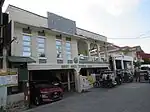 Tabing Ilog Barangay Hall
Tabing Ilog Barangay Hall
References
- Municipality of Marilao | (DILG)
- Reyes-Esterope, Carmela (October 13, 2022). "Councilor sworn in as new vice mayor of Marilao town in Bulacan". Inquirer.net. Retrieved October 16, 2022.
- "2015 Census of Population, Report No. 3 – Population, Land Area, and Population Density" (PDF). Philippine Statistics Authority. Quezon City, Philippines. August 2016. ISSN 0117-1453. Archived (PDF) from the original on May 25, 2021. Retrieved July 16, 2021.
- Census of Population (2020). "Region III (Central Luzon)". Total Population by Province, City, Municipality and Barangay. Philippine Statistics Authority. Retrieved 8 July 2021.
- "PSA Releases the 2018 Municipal and City Level Poverty Estimates". Philippine Statistics Authority. 15 December 2021. Retrieved 22 January 2022.
- Act No. 932 (8 October 1903). An Act Reducing the Twenty-five Municipalities of the Province of Bulacan to Thirteen. Retrieved July 3, 2023.
{{cite book}}:|website=ignored (help) - "Marilao". Provincial Government of Bulacan. Retrieved July 3, 2023.
- "Marilao: Average Temperatures and Rainfall". Meteoblue. Retrieved 12 May 2020.
- "Bulacan, Philippines: Marilao, Bulacan: General Info". Bulacan.gov.ph. Retrieved 2016-12-07.
- Census of Population and Housing (2010). "Region III (Central Luzon)". Total Population by Province, City, Municipality and Barangay. National Statistics Office. Retrieved 29 June 2016.
- "City of San Jose Del Monte's biggest village now split into 4 — Comelec". Inquirer.net. March 26, 2023. Retrieved April 26, 2023.
- "Central Luzon population stands at 12.4 M". Philippine Information Agency. July 29, 2021. Retrieved April 26, 2023.
As supported by: "Highlights of the Region III (Central Luzon) Population 2020 CPH". Philippine Statistics Authority. Retrieved April 26, 2023. - "Meycauayan, Marilao in world's 'Dirty 30'-- report". Philippine Daily Inquirer. Archived from the original on 2009-06-07. Retrieved 2007-09-17.
- "Flood remains gutter-deep along McArthur Highway in Marilao, Bulacan". GMA News. GMA News. July 1, 2019. Retrieved July 31, 2019.
- Census of Population (2015). "Region III (Central Luzon)". Total Population by Province, City, Municipality and Barangay. Philippine Statistics Authority. Retrieved 20 June 2016.
- Censuses of Population (1903–2007). "Region III (Central Luzon)". Table 1. Population Enumerated in Various Censuses by Province/Highly Urbanized City: 1903 to 2007. National Statistics Office.
- "Province of Bulacan". Municipality Population Data. Local Water Utilities Administration Research Division. Retrieved 17 December 2016.
- "Poverty incidence (PI):". Philippine Statistics Authority. Retrieved December 28, 2020.
- "Estimation of Local Poverty in the Philippines" (PDF). Philippine Statistics Authority. 29 November 2005.
- "2003 City and Municipal Level Poverty Estimates" (PDF). Philippine Statistics Authority. 23 March 2009.
- "City and Municipal Level Poverty Estimates; 2006 and 2009" (PDF). Philippine Statistics Authority. 3 August 2012.
- "2012 Municipal and City Level Poverty Estimates" (PDF). Philippine Statistics Authority. 31 May 2016.
- "Municipal and City Level Small Area Poverty Estimates; 2009, 2012 and 2015". Philippine Statistics Authority. 10 July 2019.
- "PSA Releases the 2018 Municipal and City Level Poverty Estimates". Philippine Statistics Authority. 15 December 2021. Retrieved 22 January 2022.
- Silverio, Frederick (October 11, 2022). "Marilao mayor dies in road mishap". The Manila Times. Retrieved October 25, 2022.
- "Tallest Divine Mercy statue unveiled in Philippines - UCA News".
- "Claretian Communications Foundation, Inc". www.claretianpublications.com. Archived from the original on February 2, 2014.
- "List of Parishes of the Roman Catholic Diocese of Malolos | Philippin…". Archived from the original on 16 April 2013.
